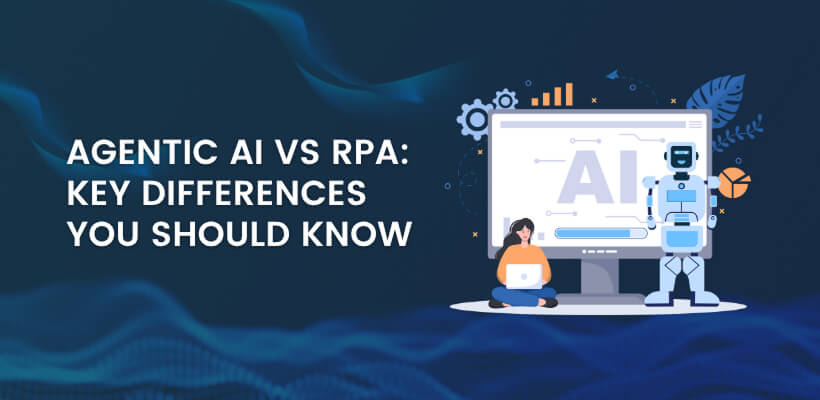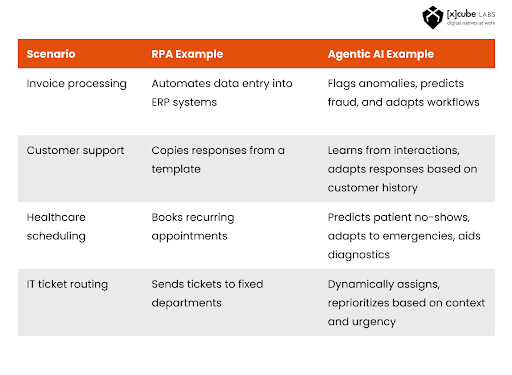Agentic AI and Robotic Process Automation (RPA) are often mentioned together in enterprise automation, but they represent fundamentally different approaches to scaling business efficiency.
Understanding the key differences between Agentic AI vs RPA is crucial for organizations aiming for sustainable digital transformation and true process innovation.
What is Agentic AI?
Agentic AI refers to AI-driven systems or agents capable of autonomous decision-making, planning, adapting to real-time data, and pursuing goals without relying on predefined scripts.
These systems leverage advancements such as large language models, machine learning, and contextual reasoning to operate flexibly across dynamic environments.
- Agentic AI is goal-driven and can handle unstructured or evolving data.
- It adapts its actions based on new inputs and learns from its experiences.
- Agentic AI is ideal for tasks requiring complex problem-solving, context-awareness, and multi-step decision-making.
- Leading analyst firms, like Gartner, forecast that by 2026, over 60% of enterprise AI applications will have agentic capabilities, up from less than 10% in 2023.
What is RPA?
Robotic Process Automation (RPA) is designed to automate repetitive, rule-based business processes, such as data entry, invoice processing, and form filling. RPA bots excel in structured environments, mimicking prescribed human actions without deviation.
- RPA is rule-based and strictly follows programmed instructions.
- It is deterministic, the outcome is predictable as long as the process doesn’t change.
- Deployment is fast, integration with legacy systems is straightforward, and it’s highly reliable for stable processes.
- Forrester and Gartner have noted that RPA remains relevant for automating bulk transactional work and bridging old systems with newer workflows.
Agentic AI vs RPA: Key Differences
Autonomy vs. Scripted Execution
- Agentic AI agents act autonomously, using real-time data, making decisions, and adapting strategies to meet their objectives.
- RPA operates on predefined scripts and is unable to handle exceptions that require deviation from its programmed logic.
Flexibility vs. Rigidity
- Agentic AI is designed for adaptability; if an input changes, the AI can adjust its actions accordingly, ideally suited for dynamic processes.
- RPA is rigid; any change in the process or data format typically requires human intervention and reprogramming.
Suitability by Task Type
- RPA is ideal for stable, repetitive tasks such as payroll processing or data migration.
Learning and Improvement
- Agentic AI continually ‘learns’ from new data and outcomes, self-improving over time (for example, AI support agents expanding capabilities after training on new datasets).
- RPA does not learn; improvements only occur with manual updates to scripts or logic.
Scalability
- Agentic AI agents scale exponentially, generalizing across workflows and learning on the job.
- RPA scales linearly — growth means more scripts and bots, each tailored to individual processes.
RPA vs Agentic AI Differences: Real-World Examples
RPA vs Agentic AI: Business Impact
Agentic AI vs RPA isn’t a replacement debate; both excel when applied to the right problem. Agentic process automation is now elevating automation ROI.
- According to Gartner (2025), 82% of HR leaders plan to deploy agentic AI in the next 12 months, and 62% of businesses deploying agentic AI expect more than 100% ROI, with performance improvements ranging from 50–200% (such as labor efficiency and faster onboarding).
- Forrester highlights agentic AI as a competitive frontier, driving enterprise-wide adaptability and productivity beyond what RPA can deliver.
The Future: Combining RPA and Agentic AI
Industry experts recommend integrating agentic AI alongside RPA for a complete digital transformation strategy.
RPA offers stability and precision for transactional, structured processes, while agentic AI injects intelligence, adaptability, and learning where workflows become complex or unpredictable.
- Nearly 75% of business leaders are piloting agentic AI solutions for next-generation process automation, according to Automation Anywhere, with Gartner anticipating a major consolidation in the agentic AI market as provider supply currently outpaces demand.
- As agentic process automation matures, expect organizations to shift away from manual task bots towards fully automated, goal-driven enterprise workflows.
How is Agentic AI Different from RPA? Quick Reference
- Agentic AI: Goal-driven, autonomous, adaptive, learns over time, handles unstructured and complex processes.
- RPA: Script-driven, non-adaptive, deterministic, excels in structured, repetitive tasks with minimal variance.
Conclusion
Understanding the differences in agentic AI vs RPA helps leaders make informed choices about automation strategy.
Agentic AI agents represent a new era of digital transformation, enabling organizations to move beyond efficiency toward intelligent, outcome-driven enterprise automation.
Industry analysts, such as Gartner and Forrester, foresee a hybrid future where adaptability, scalability, and autonomous process improvement define digital enterprise success.
Frequently Asked Questions
1. What’s the simplest difference between Agentic AI and RPA?
Agentic AI is a goal-driven brain that adapts to its environment. RPA is a task-driven hand that follows a script.
2. Is Agentic AI replacing RPA?
No, they solve different problems. Agentic AI handles complex, dynamic processes (like decision-making), while RPA handles stable, repetitive tasks (like data entry).
3. When should I use Agentic AI vs. RPA?
Use Agentic AI for complex, adaptive processes (e.g., customer service decisions). Utilize RPA for straightforward, reliable, and high-volume tasks (e.g., data entry).
4. What is the main business benefit of Agentic AI?
Autonomy. Agentic AI learns, handles exceptions, and automates entire workflows, not just single tasks, which allows it to scale more effectively.
5. Can Agentic AI and RPA work together?
Yes. An Agentic AI can perform the “thinking” (such as deciding on an invoice) and then direct an RPA bot to perform the “doing” (like entering the data).
How Can [x]cube LABS Help?
At [x]cube LABS, we craft intelligent AI agents that seamlessly integrate with your systems, enhancing efficiency and innovation:
- Intelligent Virtual Assistants: Deploy AI-driven chatbots and voice assistants for 24/7 personalized customer support, streamlining service and reducing call center volume.
- RPA Agents for Process Automation: Automate repetitive tasks like invoicing and compliance checks, minimizing errors and boosting operational efficiency.
- Predictive Analytics & Decision-Making Agents: Utilize machine learning to forecast demand, optimize inventory, and provide real-time strategic insights.
- Supply Chain & Logistics Multi-Agent Systems: Enhance supply chain efficiency by leveraging autonomous agents that manage inventory and dynamically adapt logistics operations.
- Autonomous Cybersecurity Agents: Enhance security by autonomously detecting anomalies, responding to threats, and enforcing policies in real-time.
- Generative AI & Content Creation Agents: Accelerate content production with AI-generated descriptions, visuals, and code, ensuring brand consistency and scalability.
Integrate our Agentic AI solutions to automate tasks, derive actionable insights, and deliver superior customer experiences effortlessly within your existing workflows.
For more information and to schedule a FREE demo, check out all our ready-to-deploy agents here.
 1-800-805-5783
1-800-805-5783 
